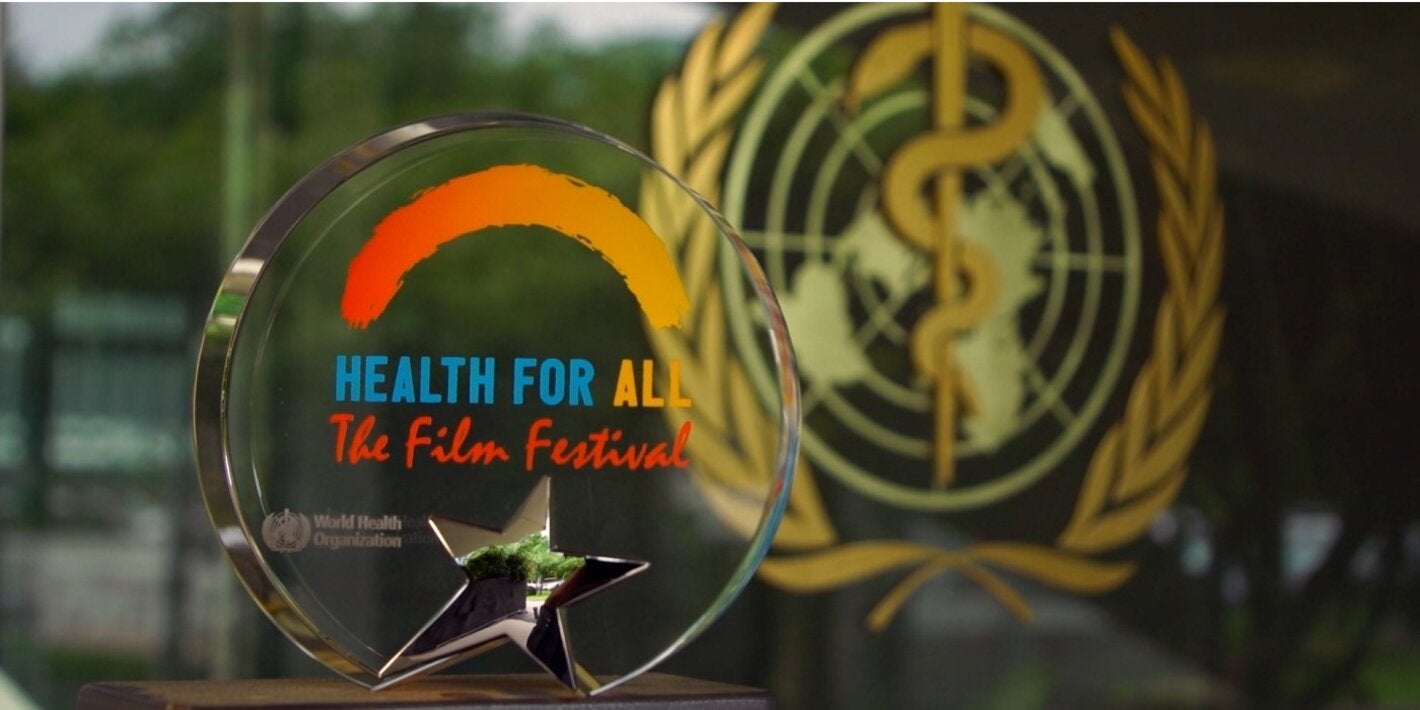
7 winning short films, 4 special mentions from the jury, including two from Latin America
Geneva, 6 June 2023 (WHO) - The World Health Organization has announced the official selection of this year’s winning films at its 4th Annual Health for All Film Festival, held at WHO Headquarters, Geneva. The event, attended in person and online by actors, producers and public figures, saw winning films announced for 7 different categories, while 4 films received special mentions from the jury.
This is the fourth year of the film festival and competition was no less fierce, with some 93 shortlisted films covering issues ranging from anxiety and depression through to the effects of climate change on health, as well as the health challenges of people with disabilities. The films were judged by a panel of distinguished professionals, artists and activists, including the renown actors, Sharon Stone and Alfonso Herrera, dance choreographer, Sherrie Silver, climate activist, Sophia Kianni and media personality, Adelle Onyango. They were joined by senior United Nations officials and WHO staff.
“The Health for All Film Festival brings a human face to WHO’s scientific work,” said WHO Director-General, Dr Tedros Adhanom Ghebreyesus. “Listening to the voices of people affected by health issues is a powerful way to raise awareness and improve our understanding of people’s experiences and this can help us advance towards health for all.”
From the official selection one “GRAND PRIX” is attributed for each of the three main competition categories: Universal Health Coverage, Health emergencies, and Better health and well-being, which align with WHO’s Triple Billion Targets.
Sharon Stone, Golden Globe and Emmy Award-winning actress from the United States of America, producer and activist for health and humanitarian causes said:
"I am delighted to be part of the Health for All Film Festival. This is about creating better awareness on crucial actions needed for reaching healthier living conditions around the world. The stories selected talk to us about the intrinsic value of good health and its access, and they advocate for universal health coverage. Universal Health Coverage is a very important right, it’s a human right for everyone around the world."
Four special prizes were also given for a Student-produced film, a film on Climate Change and Health, a film on Sexual and Reproductive Health and Rights and a Very Short Film.
The theme of mental health featured heavily in this year’s winning entries, including a powerful and moving short film from Sweden about anxiety and depression. The film, set to a stirring soundtrack, featured a series of actors expressing different stages of anxiety and how it can manifest itself. The overall message was that you are not alone in experiencing negative thoughts and that it is okay to acknowledge such feelings.
Another winning film, from Bangladesh, features a young boy who was exposed to lead from a local factory. The moving film details the effects this has had on his educational development and the work that a local non-governmental organization has done to both highlight the issue and take action to prevent lead poisoning in the affected community.
LIST OF FILMS AWARDED:
UHC “GRAND PRIX”:
“Jonathan’s Miracle Feet” – Sierra Leone / Disability, clubfoot Directed by Mamihasina Raminosoa and Nantenaina Rakotondranivo from Madagascar for the NGO Miracle Feet / Documentary – Duration 3’19’’
Health Emergencies “GRAND PRIX”:
“Nurses facing Covid / Na Lihna de Frente” – Brazil / COVID-19 and access to care Directed by Klimt Publicidade and the institution Conselho Federal de Enfermagem – Cofen – From Brazil / Documentary – Duration 8’
Better Health and Well-being “GRAND PRIX”:
“One in 36 Million: Story of Childhood Lead Poisoning in Bangladesh” – Environmental health – Directed by Mitali Das and Arifur Rahman (Bangladesh) for the NGO Pure Earth Bangladesh/ Documentary – Duration 6’32’’
SPECIAL PRIZE Climate Change and Health Film:
“When climate change turns violent” – Global / Gender based violence and climate change - Directed by Vandita Sariya (India) / Documentary - Duration 4’32’’
SPECIAL PRIZE Sexual and Reproductive Health and Rights film:
“Vulvo and Dynia” – Israel / Vulvodynia Directed by Dina Stescovich (Israel) / Fiction – Duration 4’13’’
STUDENT FILM PRIZE:
“Gasping for life” – Germany / Mental health, screens addiction, anxiety, depression Directed by Su Hyun Hong (Germany) / Animation – Duration 8’
SPECIAL PRIZE Very Short Film
“Mirrors” – Sweden / Mental health, depression Directed by Paul Jerndal (Sweden) / Fiction – Duration 3’
FILMS RECEIVING A SPECIAL MENTION FROM THE JURY:
Health Emergencies Special Mention:
“My roots: Mayas during Covid-19” – Guatemala / COVID-19 Directed by Ángela Lucrecia Chiquin (Guatemala) / Documentary – Duration 3’11’’
Better Health and Well-being Special Mention:
“Love Shades” – Global / Mental health, depression and empathy Produced and Directed by Stephanie Stan (USA) and Pratick Paudel (Nepal) / Fiction – Duration 5’51’’
Climate Change and Health Special Mention:
“Freedom to breathe: a child’s right to breath clean air” – Global / Asthma and air pollution Directed by Georgette Thomas (United Kingdom) / Documentary – Duration 5’39’’
Very Short Films Special Mention:
“I am naked / Je suis nue” – France / Violation of privacy; Mental health; Emotional violence against women Directed by Alexandra Mignien (France) / Fiction – Duration 2’20’’
For more details on the official selection, the jury composition and to watch the films and awards ceremony, visit https://www.who.int/film-festival
- Media contact: Gilles Reboux, WHO Film Festival lead, rebouxg@who.int
- Media inquiries: mediainquiries@who.int



